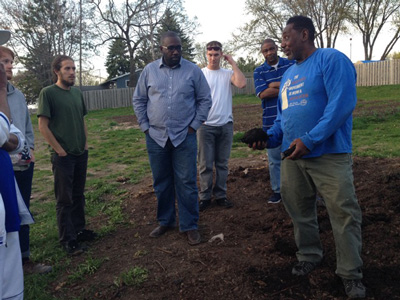By Dadit Hidayat
Just like his farming journey, Robert Pierce, Manager of the South Madison Farmers’ Market (SMFM), has struggled to keep the market in existence. But in the past 12 years, he has kept it going despite the lack of continuity of vendors selling their produce at the market.
“Vendors come and go from our market. I don’t blame them; they need profit. But that’s the thing–when we serve fresh food to a food desert community such as in South Madison, profit can’t be the ultimate goal. There are others elements that we should embrace too as important as getting profit,” Robert shared about how vendors could have been a key.

For some, he may be perceived as a difficult person to work with. But he is who he is because of his journey being an African American urban farmer over the past three decades, protecting his community. Although glad that local food is gaining in popularity, Robert observes that the local food movement in Madison has forgotten about the socially or culturally marginalized consumers living in South Madison. Very little of the scene in Madison is concerned with truly building food justice.
“Another dimension of food justice is empowerment, to be more independent. Maybe, we have to grow our own food, just like what I have done for my family. This way we don’t have to rely on others to get our food,” Robert continued.
In the fall of 2013, he started a collaborative project with students from the UW-Madison’s Nelson Institute. He looked for extra support to continue the market.
“I don’t really want do this,” he once said to these students about managing the market, “but I need to, otherwise who else?”
He was also firm, “I want this market to have a clear future for its sustainability.”
After working with two groups of Nelson students engaging vendors and community groups, Robert then connected with Jerome Dillard, the Dane County Jail Coordinator. He would like to learn on the possibility of empowering formerly incarcerated individuals through urban agriculture. Students followed up to connect with the Director of Reentry Service at the Nehemiah Center for Urban Leadership Development, Anthony Cooper.
“It’s a great idea!” Anthony responded immediately.

“Getting employment is a constant struggle for these people with criminal history. It is not only about the lack of skills or confidence, but particularly some negative perceptions about their history. Working with them to become an urban farmer and set up an own business entity have potentials,” Anthony suggested with confidence.
“But being a farmer is not for everyone,” Robert made it clear. “We need to find those who are genuinely committed to the cause of South Madison’s food injustice.”
In the spring of 2015, Robert, Anthony, and students developed a plan to identify future farmers from the Nehemiah’s ManUp program. They also put together a proposal to the Ira and Ineva Reilly Baldwin Wisconsin Idea Endowment. The proposal was approved for a two-year project starting next month, July 2015.
“We will identify two to three future farmers and work with them to learn about commercial urban agriculture with Will Allen at the Growing Power Milwaukee,” Robert illustrated the plan.
“We will then work with them in actually growing food on farmland, kindly provided by the Madison Metropolitan Sewarage District, selling the produce at the market, and maybe selling at other places,” Robert detailed further.
“It is more than just about farming, this project is about giving these folks confidence that they could be a leader to their community, unlike the negative perceptions toward them,” Anthony explained about the project.
“I have zero knowledge on urban farming. This collaboration with SMFM opens a new set of resources for an innovative reentry program. I look forward to working together with all partners,” Anthony enthusiastically responded to the recent approval of the project by the UW-Madison’s Office of the Provost.
“We certainly need more support. We have a plan, but this two-year project is just the initial effort. The project will fund the training, and provide stipend to the selected farmers during the growing season. They will also benefit from the revenue from selling the produce,” Robert further explained about the project.
UW-Madison’s Morgridge Center for Public Service and the Dane County UW Extension are also members of the partnerships.
For questions about the project and/or how to support, please contact Abby Jackson.